The Indian villagers forced into sex slavery as a result of climate change
In the remote Sundarbans, Namita Singh meets women who were trafficked as young girls after their homes were devastated by extreme weather events

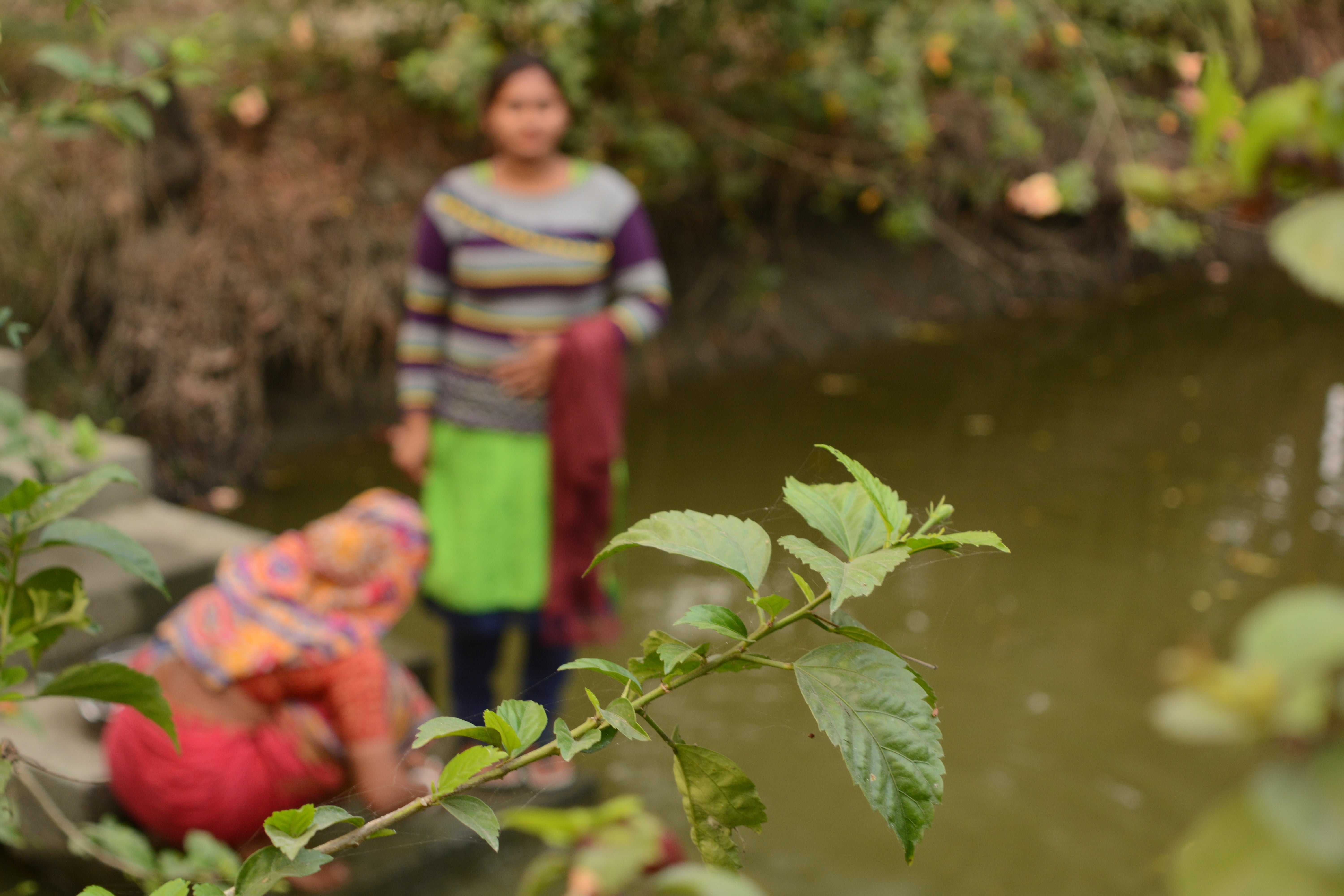
Your support helps us to tell the story
From reproductive rights to climate change to Big Tech, The Independent is on the ground when the story is developing. Whether it's investigating the financials of Elon Musk's pro-Trump PAC or producing our latest documentary, 'The A Word', which shines a light on the American women fighting for reproductive rights, we know how important it is to parse out the facts from the messaging.
At such a critical moment in US history, we need reporters on the ground. Your donation allows us to keep sending journalists to speak to both sides of the story.
The Independent is trusted by Americans across the entire political spectrum. And unlike many other quality news outlets, we choose not to lock Americans out of our reporting and analysis with paywalls. We believe quality journalism should be available to everyone, paid for by those who can afford it.
Your support makes all the difference.It is a little past 6pm. The sun has already gone down, but 13-year-old Tara* is not yet home. She is out for her tuition classes in the neighbourhood, says her grandmother Aaravi*. Though Tara is not late, her grandmother is visibly worried.
It is not until she sees the familiar silhouette of a 3ft-tall girl wearing a traditional salwar kameez dress and swinging her hands from side to side that Aaravi gives a sigh of relief. “She is here,” announces the grandmother, though she still won’t take her eyes off Tara until she is safely inside the boundary of their home.
Aaravi was not always this protective of her granddaughter, she tells The Independent, even though the family live in a district of the Sundarbans mangrove forest, a Unesco world heritage site that has been dubbed the “cyclone capital of India”.
Located about 110km (68 miles) from the state capital Kolkata, the district known as 24 Parganas suffers a cyclonic storm on average once every 20 months, making it statistically the most badly affected by cyclones in the entire country. Mangrove forests historically offer good protection from these weather events, absorbing the impact of storm surges, and communities here have adapted to cope with the conditions.
But studies show that the tropical storms are growing in intensity and frequency as a result of the climate crisis, and Cyclone Yaas struck the district with particular ferocity in May 2021, with Tara’s house, built from clay, among the 300,000 homes that were damaged or destroyed.
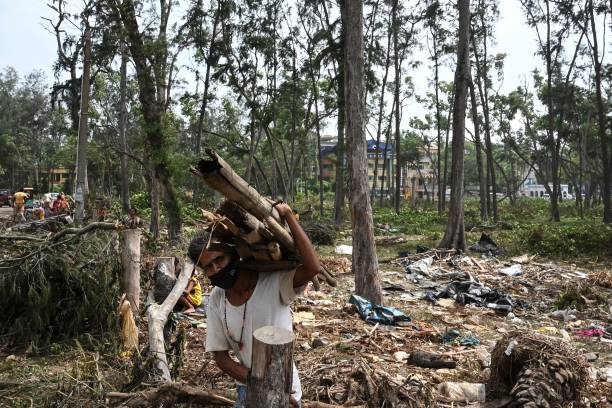
The cyclone’s immediate impact was a blow to Tara’s family, but the destruction of their home was not what changed their lives for ever. That came in the aftermath of the storm, when the 11-year-old was trafficked into sex slavery.
Tara’s father was forced to move away from their village to seek work as a driver in Kolkata; her mother had died when she was six. After the cyclone struck and “the entire village was submerged in water for days”, there was nowhere for Tara to stay, her grandmother says. “So I sent her to live with her aunt, [who was] living close by.
“Her husband seemed more than happy to take Tara in,” she adds.
It was an error of judgement, says Aaravi. In August 2021, Tara was abducted, trafficked 1,600km away to Delhi, and forced into sex work. “One day, he took me out,” recalls Tara, referring to her uncle. “He fed me with chapati and ladoo. I fainted after having it. When I woke up, I was in a train.
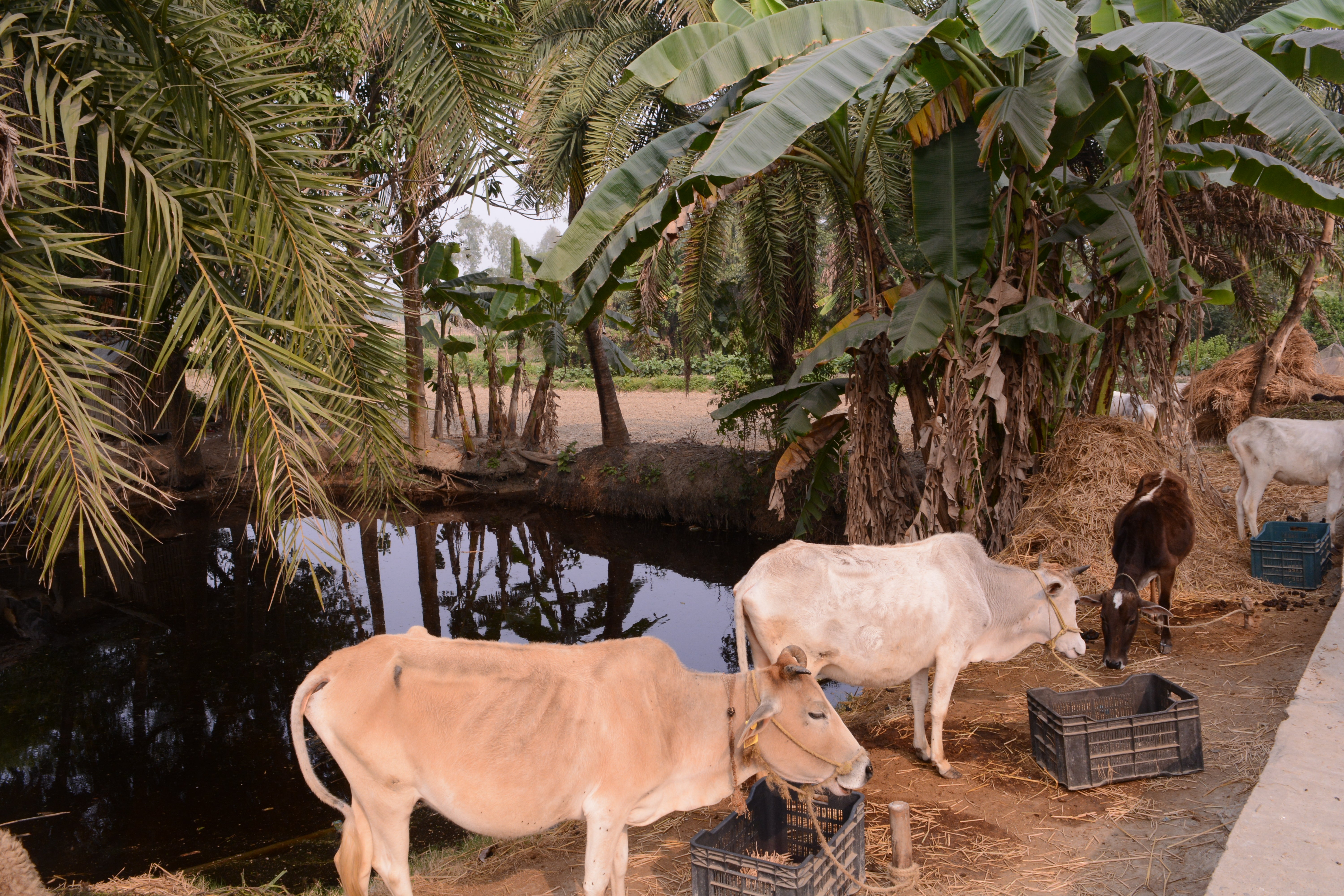
“I was very scared,” she says. “In Delhi, there was a house in an isolated place where I was kept. I did not even understand what happened with me there. I did not know anything about what trafficking means,” she says in a voice that is barely audible.
“They forced me into prostitution... I used to cry and resist, but they used to beat me more. I did not even know that I was trafficked,” she says. “I did not understand anything. I used to just miss my home.”
Neither Tara nor her grandmother accepted her fate without a fight. “I had gone mad without her,” says Aaravi. “I went from pillar to post – from police, to occultist, to anyone who would claim to help me in bringing her back.”
Eventually Aaravi found a local NGO, Goranbose Gram Bikash Kendra (GGBK), which works with police to rescue women and girls from trafficking. At the same time, Tara managed to befriend a girl in Delhi around her age, who informed the local authorities about her situation.
Realising they were being investigated and could soon be arrested, Tara’s traffickers sent her, along with the other girl, back to West Bengal, and once she was there she made her way back to her village. But that was just the start of a long road of rehabilitation.
“Tara almost lost her sanity,” says Aaravi. “She used to scratch her wounds, self-harm, pull and eat her own hair.
“It was me who used to take her to the doctor and for counselling. Her body was scarred from the physical assault she was subjected to. She does not seem to remember much about the aftermath of the incident.”
Subhashree Raptan, the programme manager leading GGBK’s work against human trafficking, says climate change is one of the major factors that leads to trafficking in the region.
“Tara’s relatives were left penniless after Yaas hit,” she says. “All farmland was submerged under sea water, destroying their source of income. Her home was also destroyed. Her father did not have any livelihood option but to leave the village and move to the city.
“Because Tara was out of the care of her parents, the accused persons – who are also her relatives – took advantage of her vulnerability, leading to her [being trafficked].”
It’s also widely accepted that the impacts of the climate crisis are not gender-neutral, says Avni Mishra, a Delhi-based gender researcher with CGIAR, a global partnership working on food security.
“Women and men tend to suffer differently,” she explains. “And we have studies that tell us that women and children are more vulnerable to climate change... and any sort of natural extreme weather events.
“Also this happens because there is already gender inequality, and that gets [exacerbated] during climate change,” she says.
If a mother is killed during an extreme weather event, “kids are seen vulnerable, and usually the father refuses to take the responsibility, or they tend to become burdensome,” Mishra says. “So of course they’re trafficked, or sold, or married early.”
If the father of the house is killed, “then it’s a challenge for the female heads who become single and are widowed. It becomes a challenge to take care of the house.”
India saw an uptick of almost 28 per cent in trafficking during the pandemic, according to official data, with 2,189 cases registered in 2021 – though this is generally assumed to be just the tip of the iceberg, with many instances likely going unreported. And while there is clear evidence that women and children are more vulnerable during and after extreme weather events, “if they happen at a huge scale, we do not know”, says Mishra.
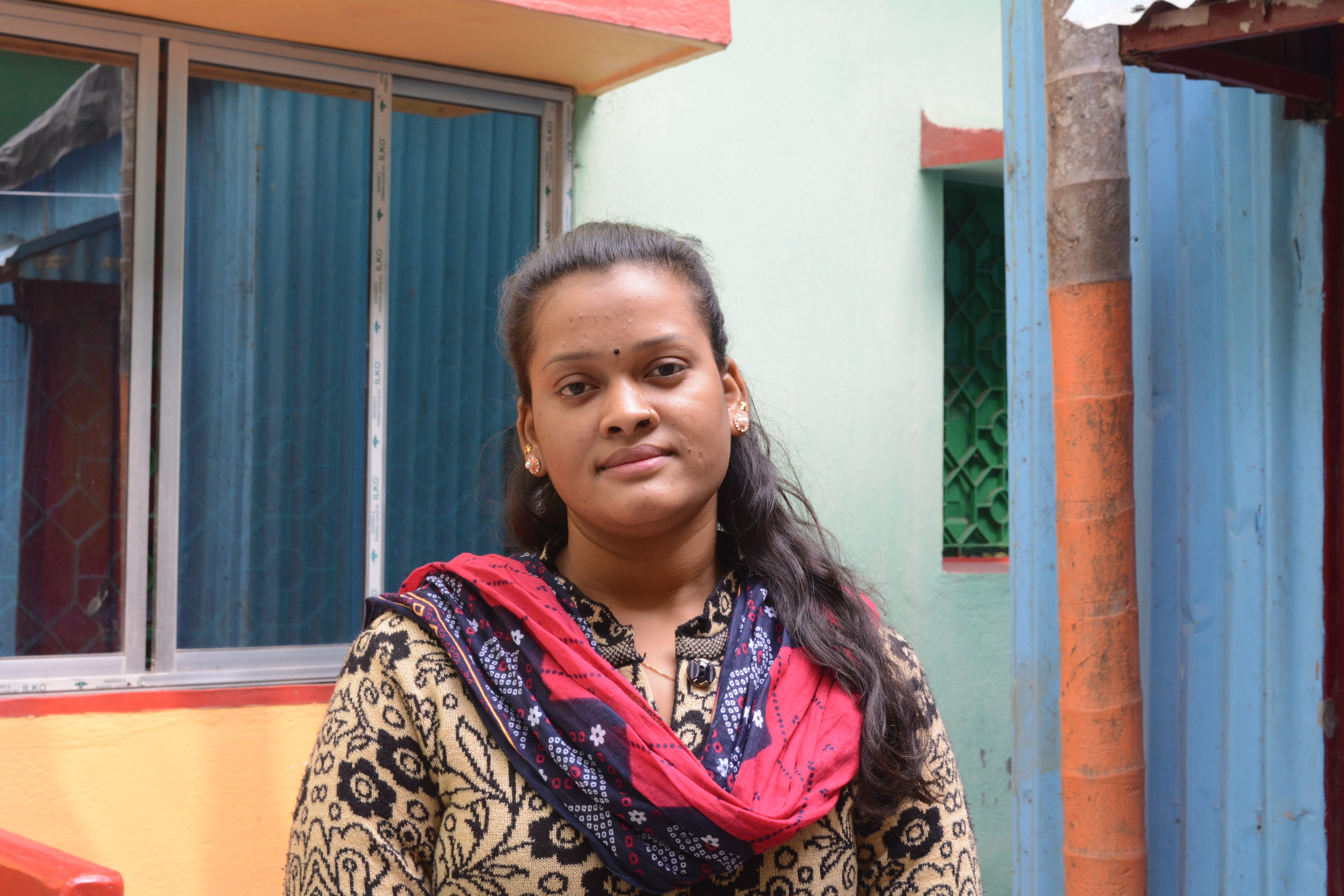
Rahima Khan was 13 when she was trafficked by her neighbours in 2012. She expressed her willingness to waive her right to anonymity as a survivor of human trafficking in order to raise awareness of the issue.
“I was returning home from school. My traffickers were waiting for me over a bridge on the way to my home,” she says, adding that she recognised them as her neighbours.
“They kidnapped me and put me inside a car. When I started to scream, they made me inhale something which left me unconscious. After a while, when I gained consciousness, I realised that while I could see everything around me, I was not able to say anything out loud.”
From the back of the car she saw a signpost for Pune, a city in India’s southwestern state of Maharashtra, located over 1,600km from her village in South 24 Parganas. “When I tried to run, my traffickers held me, threatening to chop me to pieces,” she says.
Next she was handed over to a pimp, who took her to a brothel. She would spend the next six years of her life there, before finally managing to escape with the help of a client.
“They put me in a room where there were lots of girls, all sitting in make-up,” says the 25-year-old as she narrates her story – similar to that of Tara – of physical, mental and sexual abuse, while repeatedly breaking down in tears.
“The girls who were living there for days, they told me that I have been trafficked. They told me I have been sold for Rs 100,000 (about £1,000) and have to engage in sex work. They would beat me a lot. They assaulted me physically till I agreed to their terms.”
Rahima continues: “Every day was a torture there. The women in the brothel used to burn me with cigarettes, forced me to drink alcohol, beat me. If a customer comes, and you do not take them in, they would beat you with anything they find.
“One day, one of those ladies beat me with a beer bottle. My leg was cut. Another time, I got so frustrated that I locked myself in the bathroom and tied a rope around my neck, in the hope of dying... I did not want to live there,” she says.
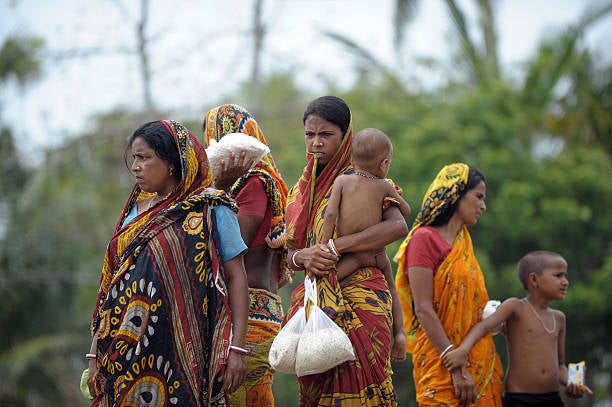
In September 2017, Rahima managed to escape. Her ordeal did not end immediately – she was followed home by her traffickers, who threatened her family with violence if they went to the police. “But when I told the authorities about the traffickers, they did not harm me further,” she adds.
Rahima’s home was destroyed in 2009 by Cyclone Aila, she says. “I was directly hit [by the cyclone], as my house is next to the river. It was made of mud, and the traffickers’ was made of concrete. So my house was completely destroyed.”
There was no work in the area because everything was submerged under water, she explains. “The financial hardships prompted both my parents to move to West Bengal’s capital, Kolkata. There, my father worked as driver and my mother started as a househelp.
“Knowing the vulnerability, my traffickers offered work opportunities to a lot of women in the neighbourhood, saying they would help them get employed so they can earn anywhere between Rs 5,000 to Rs 10,000 [per month].
“It is a lot in the village where I come from,” she says. “But we sort of suspected the intent of these men, so they never walked up to our family to offer me something similar. Instead, they abducted me.”
As with Tara and Rahima, Aditi’s* trafficker was known to her. “I really liked to dance,” she says. “But the financial condition of my house[hold] was not good. We did not have enough income.”
Aditi explained her hardship to her dance teacher, who said he would be happy to help. She never questioned his intent.
“When he offered to take me to a tailor willing to stitch the clothes for free so I could participate in a school competition, I was elated. He took me to the tailor, saying that the school does not have my size,” says the 20-year-old.
But it was a trap. As soon as she reached the tailor’s, she was drugged, she recalls. “They drugged me using a cloth. I fainted. When I woke up, I realised I was able to see everything, but could not scream or shout or call for help.”
Aged just 12 at the time of her abduction in 2015, Aditi was sold to a brothel in Delhi.
After being trapped there for at least three months, Aditi managed to steal a phone and contact her relatives. “My family contacted the police and they helped in the rescue.”
Upon her return, Aditi was traumatised. “I began to stay inside. I would not talk to anyone. I did not leave my house for four to five months.”
When she finally returned to school, “teachers and students would not speak with me”, she says. “Or they would ask intrusive questions aimed at shaming me – ‘Where were you all this while? Where are you coming from? You must have done something wrong.’”
Aditi started sitting at the back of the classroom, trying to stay invisible. “That significantly impacted my mental state. I used to faint on the way [to school], while walking outside.”
Aditi says she was helped in her recovery by a local NGO and professional counsellors. She now wants to dedicate her life to helping to counsel other victims of trafficking.
Financial independence remains a dream for Rahima, who says she is in the process of appealing to the court to review the Rs 300,000 (about £3,000) in compensation she received in 2022 after a five-year legal battle. Her traffickers are now in jail awaiting trial.

“I have challenged in the high court demanding higher compensation, because it was nothing in the face of all that I have gone through, and how it still haunts me. I want to have a business of my own. If I have my own business, then I will not have to ask anyone for help and no one would be able to exploit me, ever,” she says.
Tara, who is now extremely shy compared with the carefree person she was before, says – after a lot of encouragement – that she wants to be a doctor. “If you ask whether she wants to be a teacher, she will say yes to that as well,” chips in her grandmother, as Tara chews on her hair.
As for Aditi, alongside her advocacy work she is also pursuing a bachelor’s degree, and is happily married to her school sweetheart.
“I met my husband in school,” she says, blushing. “When he asked me out, I shared my entire story with him. But he said it does not bother him one bit.
“That was a long journey for me.”
*The names of some interviewees have been changed to protect their identities
If you are a child and you need help because something has happened to you, you can call the NSPCC free of charge on 0800 1111. You can also call the NSPCC if you are an adult and you are worried about a child, on 0808 800 5000. The National Association for People Abused in Childhood (Napac) offers support for adults on 0808 801 0331
Join our commenting forum
Join thought-provoking conversations, follow other Independent readers and see their replies
Comments